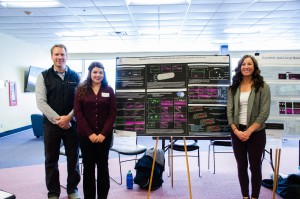A Winona State University  research team is studying a common type of aquarium fish to learn more about Multiple Sclerosis in humans.
research team is studying a common type of aquarium fish to learn more about Multiple Sclerosis in humans.
WSU Assistant Professor of Biology Jacob Hines and a group of biology students are using zebrafish as a model for examining how MS attacks a sufferer’s nervous system. The project beganin 2013 and last fall Hines, with students Madeline Martell, Anthony Treichel, Bailey Duxbury, Amanda Kaiser and Allie Trudel, presented their findings at the Society for Neuroscience Conference in Chicago.
“SFN draws 30,000 neuroscientists from around the world. Our students presented their research alongside leading experts from places like Harvard, Stanford, and Johns Hopkins,” Hines said. “Their research drew a great amount of attention and they represented WSU with enthusiasm and professionalism.”
Students Scott Steele, Nicholas Becker, Malory Owens, Heather Nelson, Cyril Thompson, Mariah Robran, Heather Torkleson, and Corey Mikorski are also working on the research project.
“The students have made really some important foundational discoveries,” Hines said. “Our team of researchers has been fortunate to be supported by the National MS Society, the WSU Foundation special projects grants, the biology department, and the College of Science & Engineering.”
MS is a disease that affects the central nervous system and disrupts the flow of information between the brain and body and within the brain. It is caused by depletion of the myelin that acts as a protective sheath for the nerve fibers.
The WSU team is focusing on why certain nerve fibers are selected for myelin repair and why others are not by analyzing the process in zebrafish, which share 70 percent of humans’ genetic code. Their findings could have applications for MS therapy.
“It is exciting that we are completing novel research that no one else has completed,” Martell said. “The uniqueness of the research gives it significance. Each time we learn something new, it is a small step toward the big picture of developing therapies for MS.”
WSU students on the research team have benefited from the project in numerous ways.
“Presenting at the Society for Neuroscience conference was absolutely amazing,” Trudel said. “It was an extremely beneficial experience for my public speaking and communication skills. It was such a crazy feeling to be in a room of experts in the field of neuroscience and have them interested in what we had to say.”
Kaiser said, “Working in Dr. Hines’ lab has opened many doors for me in the field of research. I had an opportunity to study abroad and work in Dr. Jason Rihel’s lab at University College London, which opened the door for Dr. Rihel to come to Winona State to do a seminar for biology students.”
“It’s a new and rewarding experience being able to work closely with peers and a professor to help reach a common goal,” Becker added. “I have gained a better understanding of how to go about conducting research and how our efforts can impact the rest of the world.”
Research by students and their faculty advisors is an integral part of the educational experience across all fields of study at WSU. For more information, contact University Commu
